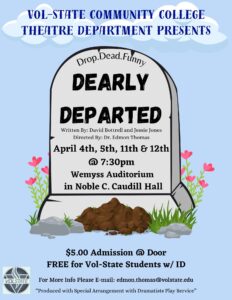By Luis Quintanilla
Brent Smith, a history professor at Volunteer State Community College, gave a presentation over New France to students and faculty on Oct. 7 on the Gallatin campus.
The presentation explored the relationship between Native Americans and the French during the colonial period in North America and the underlying lessons to be learned from the development and ultimate deterioration of this relationship.
The presentation kicked off around 1 p.m. in the Rochelle Center in the Thigpen Library at Vol State and lasted about an hour.
Before diving into the material, Smith hinted at the message and lesson to be taken away from this exploration of the relationship between the Native Americans and French.
Smith served two tours in Iraq, something he told the audience was not too different from the situation the French and Native Americans found themselves in.
While the colonial period of North America was vastly different from the wars in modern Middle East, Smith explained the ideas of maintaining allies and keeping good relations with the locals remained the same in both cases.
He said one usually fared better if relationships were kept good. If relations deteriorated or natives were not treated fairly or with respect and instead met with arrogance, they were usually the ones shooting at you the next day said Smith.
In his presentation Smith explored the start and decline of the alliance between the French and Native Americans during the colonial period in what is now Canada. The French explored the Canadian region hoping to find riches, but did so with the permission and advice from the natives said Smith. The increased contact the French had with the Native Americans required an alliance and understanding.
Smith explored the beginnings of this alliance with the fishing industry the French started in the area of Newfoundland, Canada. Not only did it help the French survive and allow for yearly settlements, but increased contact with Native Americans sparked an alliance. The natives wanted the French’s tools, and the French wanted the natives’ furs. The fur trade began rolling remarked Smith.
Smith explained that, in order for this trade to work, both sides had to maintain a healthy relationship with one another. He told about the feasts the French would partake with the natives, and the natives to show their appreciation would have belching contests to see who could belch the loudest. The system, said Smith, was to keep both parties happy. Both parties saw it as the giving of gifts, and if one side stopped giving gifts war could breakout.
The undoing of the alliance came with the arrival of Louis-Joseph de Montcalm, commander of the French forces during the Seven Years War. “The moment he arrived he promised one thing and did another,” said Smith. After meeting with the natives, Smith said Montcalm expected gratefulness but found none and called the natives an “ugly crowd.” It then followed that if their leader didn’t like the natives, the soldiers wouldn’t either noted Smith. The divide was only further fostered by texts in France highlighting the differences between the Native Americans and the French said Smith.
Smith chronicled the crumbling of the alliance with the Battle of Oswego. The French were allied with the Native Americans during the Seven Years’ War. The two parties fought side by side to take over the fort from the British, but the French then denied the Native Americans the right to collect scalps of the dead enemies. The scalps were significant to the Native Americans since their war campaigns were seasonal, and the collecting of scalps acted as trophy for the Native Americans
according to the Encyclopedia Britannica. The Native Americans got drunk and broke in and collected scalps anyway said Smith.
The straw the broke the camel’s back came at the battle for Ft. William Henry. The natives only agreed to join the fight if Montcalm allowed them to collect their scalps afterwards said Smith. Montcalm agreed but broke his promise after the fight when he denied the Native Americans the right to do so. Angered and unwilling to return empty handed to their tribes, the Native Americans dug up graves and collected the dead bodies’ scalps, said Smith. The problem was these bodies had been dead for only 6 months due to smallpox. “Entire villages were wiped out,” said Smith. The smallpox swept through and decimated the native population and they blamed it on Montcalm. The alliance had been shattered remarked Smith.
In an interview, Smith went into further detail about the lessons to be taken away from this story. “Say, ‘Ah the French and Indian War who cares? What does that matter? How does that deal with us today?,’ Well, you disregard your allies, you better or for worse piss people off then you’re not going to be able to work together, and when you don’t work together bad things happen. The French lost an empire. They lost every single thing they had in North America. What’s that lesson for us today in America?”
Smith explained repeating patterns have appeared in history and noted the fact that although the template to correct these patterns are there, people don’t appear to fully grasp them yet. “We keep coming into the same situations really. We come to the same argument, and we are still having trouble trying to figure out how to successfully manage it,” said Smith.
Smith said although people tend to think these patterns won’t happen to them, he said “Lo and behold they do.” Smith said he saw this first hand in his time in Iraq from 2006-2008.
“When we paid attention to our allies in Iraq whether it be the Iraqi National Police, the Iraqi Army, or just the civilian population, if we utilized them, if we worked with them, the relationship was pretty good. However, if we took that high ended approach ‘We’re Americans. We know best,’ that’s where bad things started to happen. Some of the people, if we disregard them the day before, well they were the same ones that were shooting at us the next day. So you really have to be careful how you treat your allies and how you respect them, because if you treat them poorly it can come back and bite you,” said Smith.
Smith brought this back to the arrogance Montcalm displayed. He explained Montcalm was of the upper crust of French society and arrogantly elevated himself above the natives. “Then you go over to their environment and you take those same attitudes, you’re going to these people who go, ‘No, you don’t tell us what to do,’ those two are going to clash. I can’t speak for all servicemen who were in Iraq, but I know at times it’s just like I said human nature. We get this mindset, ‘We are Americans. Hey let us show you how to do it,’” said Smith.
“There’s always going to be the butting of heads,” admitted Smith, “But if you want to get things done, it’s imperative for you to learn to work with one another. You have to. That’s just life. Especially today in America. We have people from all walks of life. People emigrated to this country, you got people who have been here for hundreds of years, different views, different backgrounds, different religious views, things of that nature,” said Smith.
Smith said this isn’t just an American issue, it’s of global concern.
“You can’t go at it alone. You got to have allies. And having an ally is like having a conversation. You want a problem to be solved. There’s got to be give and take on both sides. There’s got to be that middle ground and I think that’s the problem today,” said Smith. Smith said countries like
America must decide whether to step back from its allies, or work with allies instead of bullying the conversation.
Smith said he would like to see the alliance side of things play out instead of the alternative. “I saw first hand what happens when you disregard your allies,” said Smith.
“We got to work together. We may not like each other. Not everybody’s going to like each other, but you’re going to have to work together. So until we do that, I’m not sure we can meet our full potential.”
Brent Smith is a history professor at Vol State who teaches US and World History. He said history is “what I live, it’s what I breathe.” Smith said he finds the lessons to be learned from history fascinating.




Comments are closed.